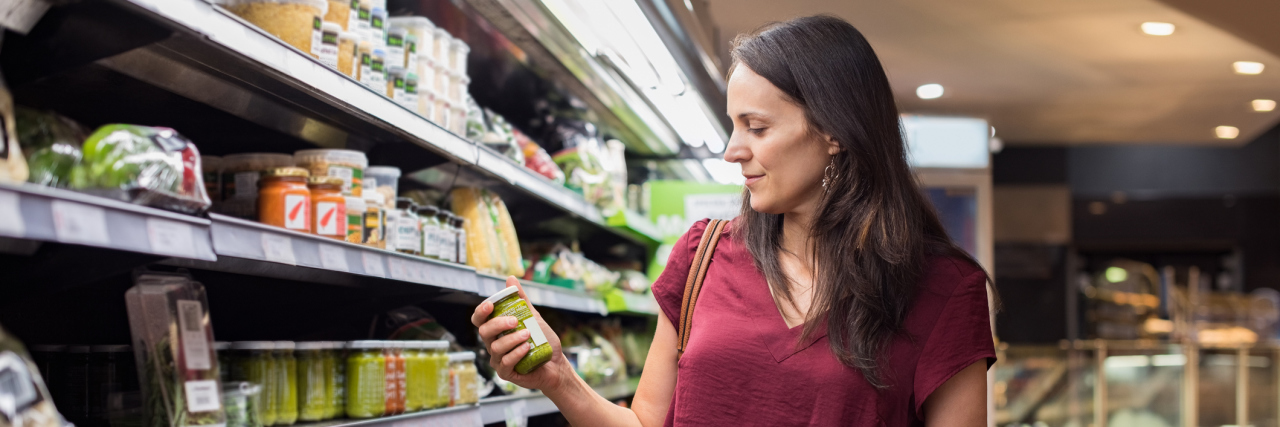Why I'm Not Changing My Diet as Someone With Autoimmune Disease
It’s well-meaning but unwanted.
It’s sincere but unsubstantiated.
It’s born from good intentions but not fact.
It’s the advice I receive from friends and casual acquaintances. It’s the articles my husband emails me.
It’s the idea that my autoimmune disease, my inflammation, my pain could all magically disappear if only I didn’t eat certain things or started eating other things.
And it’s not just limited to me and my specific medical issues. Especially here in Los Angeles, with our food-obsessed culture, anyone, with any sort of medical condition, is told that the remedy to what ails them is to either add or subtract food.
I’m told to “go gluten-free.” “Give up red meat.” “Avoid all sugar.” “Try a Mediterranean diet.” “Adopt the autoimmune diet.”
But the thing is: I don’t want to.
I don’t want to try something that may or may not work. Because the bottom line is nothing will make my illness completely disappear, and the cost of giving up – not just foods, but more of who I am – just doesn’t outweigh the chance that it could work a little.
If it was that easy, if all it took was some eating modifications, food would be the panacea for everyone living with autoimmune diseases (or cancer, infertility, or any number of afflictions), and no one would suffer. But it doesn’t work that way. With autoimmune diseases, and there are more than 100 of them, there is no one-size-fits-all, cure-all program. Treatment often looks like a “Let’s try this, and hope for the best” approach.
When I’ve asked my rheumatologist about supplementing my prescription medication with alternative treatment options (heat, ice, massage, acupuncture), his answer is always the same: “Try it; it won’t hurt.” But the flip side of that is we don’t know exactly what will help either.
Patients, all types of patients, are often given the general “do this” list: exercise, get enough rest, drink lots of water, limit alcohol, eat plenty of fruits and vegetables. And along with taking my medications, maintaining my check-in appointments and trying to stay somewhat physically active and reduce stress, there’s not much else I can do. More and more, I feel as if my body is out of my control, and one of the few things I can try to control is what I eat each day.
At this point, I am “well enough.” I am fully functioning and independent. I create the impression that I am fine. Because if I can fool other people that I am, maybe I can fool myself too. If I can keep going, keep holding on to the things I used to do (gardening, riding my bike with my son, going for walks in our neighborhood), I can try and tell myself I’m still OK. I can get by, make do, fudge it if I have to, in order to live each day, as much as I can, on my terms.
Last year I experienced digestive issues and learned that it’s very common for patients living with autoimmune diseases to develop digestive problems. I didn’t eat for days and when I did, nothing stayed down. I struggled to make it through one bottle of water a day. At one point, I received an IV because of dehydration. Doctors did what they always do; they referred me to a specialist (a gastroenterologist) and they did tests (ultrasounds and an endoscopy). And as tends to happen with me, many things were ruled out, but nothing conclusive was determined to be causing the change in my eating.
Now a year later, I continue to lose weight and my appetite has changed. From time to time, I’m simply not very hungry. There are things I no longer have a desire to eat (my intake of chocolate ice cream has drastically decreased in this last year). So now I eat what I want, when I want.
I don’t want to change my life any more than it already has been changed. Every aspect of my life has been touched by this disease. I left my teaching career. I no longer wear skirts with panty hose because I can’t wear anything tight around my legs. I have memorized the phone number to my local CVS pharmacy. I am a stay-at-home mom who sometimes cries while cooking dinner because my pain intensifies as the day wears on. I see a therapist on a regular basis to help me recognize I’m still a young woman, because I often feel as if I’m trapped in an old woman’s body.
Maintaining a least-restrictive diet allows me to more fully participate with my family. I, too, can have a sandwich when we bring in Subway for a fun family dinner and movie night. I can spend time with my son in the kitchen, making a Ghirardelli dark chocolate cake. I can go out on a coffee date with my husband, special not just because it’s the two of us together, but because our very first date more than 20 years ago was at a Starbucks. I can participate in the experience of a shared meal as opposed to the isolation of medication and discomfort.
Even though I may be in some degree of pain, I can continue to hold on to who I am.
Getty Image by Ridofranz

